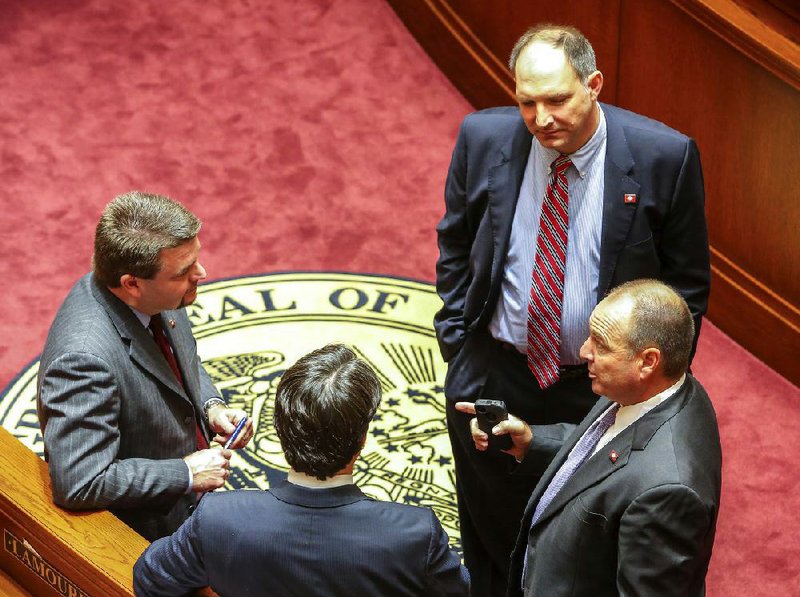A bill to allow the state Department of Education to keep property taxes from school districts with unusually high property-tax revenue failed Friday after the House Education Committee blocked it.
RELATED ARTICLE
http://www.arkansas…">Health-plan fix sails at special session
House Bill 1010, sponsored by Rep. Joe Jett, D-Success, would have allowed the department to redistribute millions of dollars of millage funds from the handful of school districts that have much higher-than-average property-tax revenue.
A companion bill, Senate Bill 7, sponsored by Bruce Maloch, D-Magnolia, was filed in the Senate chamber Thursday.
Every school district in the state is required by the state constitution to levy a property tax of at least 25 mills for maintenance and operations. The money is sent to Little Rock and returned to the schools.
Most districts receive additional money from the state Education Department to achieve equal “foundation funding” - $6,393 per pupil in 2013-2014. Foundation funding is the single biggest source of funds for Arkansas schools.
But eight school districts - Armorel, Eureka Springs, Fountain Lake, Mineral Springs, Nemo Vista, South Side, Quitman and West Side - collect more than the minimum amount.
The districts are outliers, and the number can fluctuate year to year. Armorel, for example, has a steel mill it can tax. Mineral Springs’ territory includes a new coal fired power plant. Others are tourist destinations and retirement spots or sit near the Fayetteville Shale.
In the House Education Committee on Friday morning, Rep. Mark Lowery, R-Maumelle, made a motion to table Jett’s bill as soon as its meeting began. The motion passed with 10 votes. A subsequent motion to revive the bill failed.
Lowery said he felt the special session was not the right time to address the school-funding issue.
The education committee met again in the afternoon. Supporters of Jett’s bill tried a final time to revisit the issue, but got only eight “yes” votes from the 20-member committee.
Afterward, Jett said his bill was dead. Each member voted in accordance with the superintendents in their districts and would not be swayed, he said.
“At the end of the day I just think that people’s minds were made up … [There was] nothing you could do to negotiate [with] either side. I think when everybody walked into the room today, everybody knew exactly where they were at,” Jett said.
Gov. Mike Beebe had encouraged the Legislature to approve the measure. Beebe told reporters Friday that a lot of people misunderstood the bill.
“Nobody is taking one dime of locally voted property tax. Nobody ever suggested that. The 25 mills is a state tax and it can’t be raised or lowered except by a vote of the entire state,” Beebe said.
The governor said he would not push to revive the bill during next year’s fiscal session, which begins Feb. 10.
Several superintendents from the eight affected school districts attended Senate and House Education Committee meetings Thursday evening and throughout the day Friday.
The Senate version of Jett’s bill passed the Senate Education Committee on Thursday evening, but its sponsor didn’t seek a vote in the full Senate, saying the issue was effectively dead.
Cody Beene, the superintendent of the Nemo Vista School District in Center Ridge, said he was relieved that the bill appeared to have failed, but “I’m still going to stay until I know it’s over.” Nemo Vista’s property-tax revenue was $397,000 above “foundation funding” in fiscal 2014.
Beene said the Fayetteville Shale has resulted in a “roller-coaster” effect on assessments in his area. While his district has at times benefited from the increased property values, he also has struggled to make long-term plans.
If the bill returns in a future session, Beene said his district will be ready to lobby legislators to keep the status quo.
“There’s a lot of things that people can sit down and look at so that we can make sure that nobody gets hurt … . This, in my opinion, doesn’t hurt anybody,” Beene said.
Sally Bennett, the superintendent of the Armorel School District, said she also would stay in Little Rock until the Legislature officially adjourned for the session. Bennett has said forfeiting about $506,000 in fiscal 2014 would have had a negative impact on the district’s ability to offer programs for students.
Rep. Bruce Westerman, R-Hot Springs, had drafted a bill that sought to prevent the state from retaining the additional funds and make it return the money to the districts. But he dropped it after learning that HB1010 had been derailed.
Westerman said he agreed that the special session was not the time to address the property-tax funds.
“I’d rather put it under the table, dig a hole and stick it in the hole, and never see it again. It’s a horrible piece of legislation,” Westerman said. Information for this article was contributed by Michael R. Wickline of the Arkansas Democrat-Gazette.
Front Section, Pages 1 on 10/19/2013

